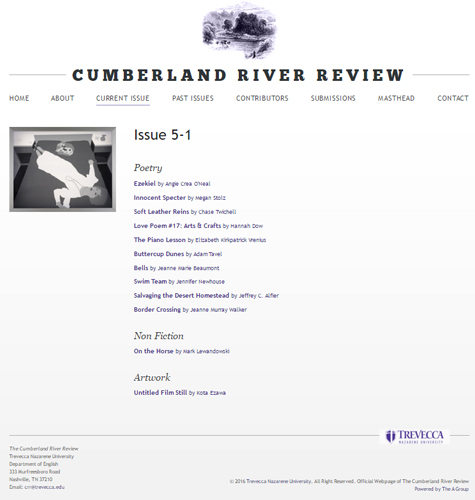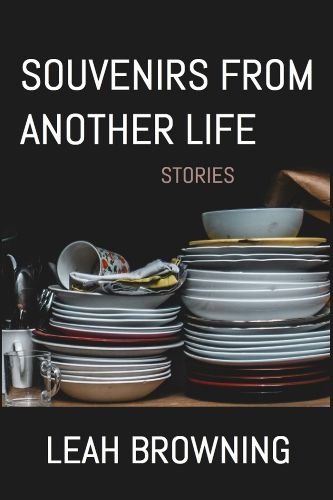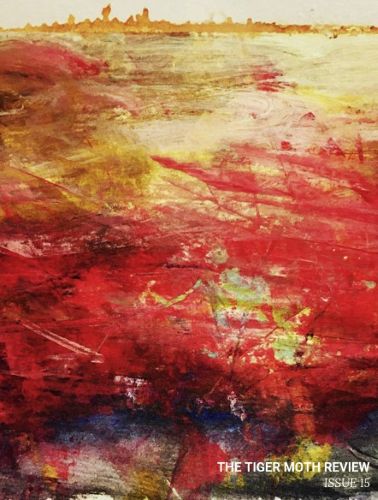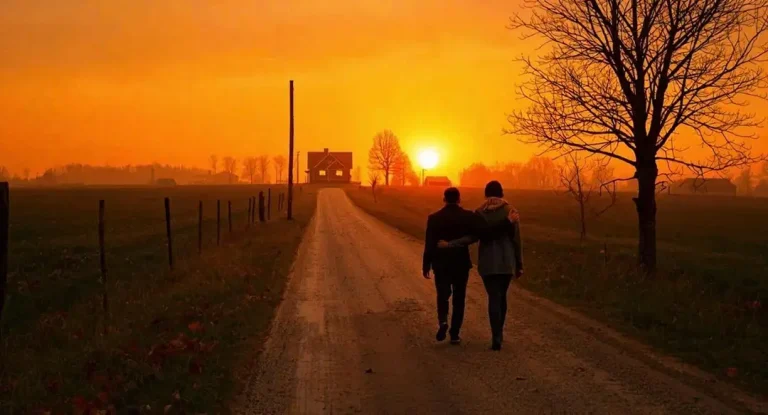Cumberland River Review’s self-defined goal is “to feature work of moral consequence—work that transports us.” And not just sometimes, but “always.” I tried to sort that out from the added fact that the publication is produced by the department of English at Trevecca Nazarene University, which could further weight whole concept of “moral consequence”— as if we English folk don’t do it enough on our own, let’s just add the mission of a Christian university to that. Relax—we’re not talking preachy, biblical moralities here. Rather, CRR editors have a clear sense of selecting writing that seeks to question, even challenge, what moral means, and in doing so, cause readers to seriously consider the consequences in their own lives. Cumberland River Review’s self-defined goal is “to feature work of moral consequence—work that transports us.” And not just sometimes, but “always.” I tried to sort that out from the added fact that the publication is produced by the department of English at Trevecca Nazarene University, which could further weight whole concept of “moral consequence”— as if we English folk don’t do it enough on our own, let’s just add the mission of a Christian university to that. Relax—we’re not talking preachy, biblical moralities here. Rather, CRR editors have a clear sense of selecting writing that seeks to question, even challenge, what moral means, and in doing so, cause readers to seriously consider the consequences in their own lives.
CRR editorial process is highly selective, limiting each issue to ten poems and one prose piece—fiction, nonfiction, or essay. That’s it—per issue. It makes for an easy one-sit reading that invites re-reading and a great introduction to writers you may not know. As a teacher, I can say it would also make an excellent class text for its not being overwhelming in content, but providing plenty to talk about.
The concept of moral consequence is, as expected, more abstract or obtuse among the poetry, but the idea of works that transport became a kind of literal-literary theme for this issue. Almost every poem was a means by which the poet or a character in the poem was transported—through physical space, but more often, through time. The opening lines of “Ezekiel” by Angie Crea O’Neal practically draw the reader in through a way-back memory machine:
Climb the streets of your first town, the one that still lives in the rill of time, there in the melting blue before rivers. Go back and make snow angels in the shallow dusting of thought, sing on the branches of unknown. Revisit and eat scrolls that tell the story of your youth. Search for old friends hanging on memory like gossamer, tell them what you’ve learned, confess to them your faults.
There is just something here to which we are all akin—going back to our childhood streets—but also something secretive and isolating about having grown up. Sort of the way any ‘going back’ feels familiar, but distant and separate from us.
Megan Stolz transports the self in “Innocent Spector” another way: “If I existed in the smoke / of a candle burring in the church, / or the steam rising from the kettle” to attempt to reconnect with “the ghost who has left me.” While Hannah Dow, in “Love Poem #17: Arts & Crafts” attempts to hold on: “If she had known / you’d go so soon she would have planted / you in the backyard alongside tomato plants / to ensure that you would thrive.” And Elizabeth Kirkpatrick Vrenius instructs the readers directly to envision her character in some place and time in “The Piano Lesson”:
Picture me: shy hungry girl at the door peering into the dark interiors, dog-eared Thompson’s 15 Easy Pieces clutched to my gingham flat-chested dress.
If there is a common element among the works in CRR that moved the editors to select them, it would be the fine detail each is able to sketch – through imagery, metaphor, the sound of the language upon the mind. “Salvaging the Desert Homestead” by Jeffrey C. Alfier offers it all, beginning with:
When she and I arrived at last, it was bindweed and thornapple, kingdoms of rodents among haphazard cacti, a desiccate tool shed that stunk of wood-rot and grease, canted like something shoved aside. But the place was never a burden.
The singular non-poetry piece in this issue is non-fiction by Mark Lewandowski, and English professor at Indianan State University—helpful to know as “On the Horse” begins with his recounting a classroom technique I think other teachers might find of interest. “In order to combat my student’s fear of poetry,” he opens the piece, “I find it best to resort to violence.” Excellent. Moral consequence be damned!
But alas, of all the works, this essay speaks most directly to the concept of moral consequence as Lewandowski tells of his use of “The Horse” by Philip Levine with students, and sharing his own story of having hit—but not killed—a squirrel while driving. Should he have gone back and killed it to put it out of its misery? Lewandowski more deeply explores the idea with his students: How can we cause such damage to existence and continue living our lives—with joy and pleasure? He shares having visited the Hiroshima Peace Memorial Museum and draws connections with his visits to Auschwitz, the Museum of Genocide Victims in Vilnius, Lithuania, and the Old Slave Mart Museum in Charleston, South Carolina. But, there, in Japan, as he leaves the memorial, he is questioned by two other visitors of Chinese descent:
“How did that make you feel?” one blurted out as soon as she reached me.
“Excuse me?”
“The museum. How did it make you feel?”
I knew what she was asking. I doubt she had confronted anyone else in the group. She wanted me, an American, to express paralyzing guilt.
It is the moral consequence of the actions of our fathers Lewandowski writes of, how we must all bear it—“it” being from whatever culture we originate. For Americans, “it” includes Hiroshima and the genocide of American Indians. Other cultures have their own for which the succeeding generations must bear the continuing responsibility. Weaving in LeGuin’s “The Ones Who Walk Away From Omelas,” Lewandowski examines the paradox of that story and of our daily lives: “Every day. I know the good life I live has been made possible through the deaths of others, and I know people, including children, continue to die for my benefit, even for stupid things like cheap gas. Still I remain in my own little Omelas.”
My recommendation for reading Cumberland River Review is to not do so alone. This is the kind of writing you would like others to have read so that you can examine through discourse the very moral issues that each author explores. I had my doubts when I first encountered this publication that the editors would be able to truly meet such a lofty goal, but this issue, and a full archive of back issues online, are proof positive.
[crr.trevecca.edu]






